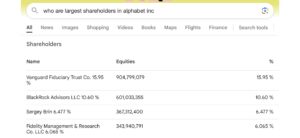Our message to Google is simple: remove the site-wide classifier that is being used to punish small, independent websites, says Jon Miksis.
If you feel there are major issues with our sites, at least give us a manual penalty and explain why.
But as it stands right now, there are thousands of legitimate websites providing immense value that are essentially being shadow banned for no apparent reason (other than to benefit a handful of major corporations that Google is financially tied to).
We aren’t asking for preferential treatment.
We just want to compete on an equal playing field against the big sites, letting the users—rather than Google’s AI algorithm—decide what constitutes helpful content.
There are dozens of ranking factors that can assess the user experience like time on page, bounce rate, etc.
If we are going to lose to the big guys, it should be based on our own shortcomings, and not a side-wide classifier.
No company should be able to flip a switch overnight that can decimate the livelihoods of thousands, if not millions of people.
It’s not just site owners who suffer from these decisions; it’s all the writers, editors, web designers/developers, SEO folks, and virtually everyone else in the online space.
All we ask is that you make this online ecosystem a fun and fair place to compete again.
Give us the opportunity to make amazing content and be rewarded for our efforts.
Without small, niche sites, the online world is going to become an uncreative, myopic place.
Just a handful of large websites will dominate the information on the web, ultimately leading to less helpful content for consumers.
If Google truly values diversity (like it says it does), then it shouldn’t be shutting out the voices of niche sites & small bloggers through a site-wide classifier.
Please open your hearts and do the right thing.
Just a reminder that Google (Alphabet Inc) is owned by the same institutional investors who own Forbes, Reddit, and every other big site that has seen astronomical gains in the recent Google updates.
Malte Landwehr:
- These “investors” are funds that in turn are owned by hundreds of thousands (millions?) of small and large investors.
- Every big site that had significant losses is “owned” by the same institutions.
Jon Miksis:
- Just because these funds are made up of millions of investors doesn’t mean that the firms managing their funds aren’t exercising broad power and influence.
- True, and they get to pick winners and losers; the winners are overwhelmingly the major corporations.
And even if some big sites of theirs took a hit, I would expect a net positive result across their portfolios.
